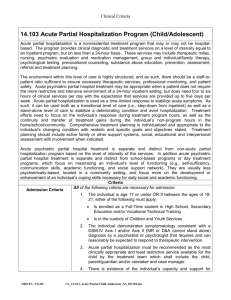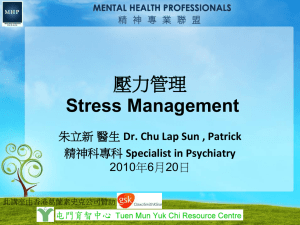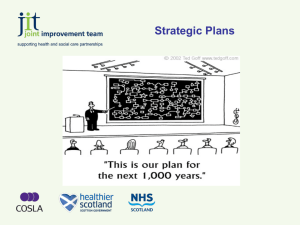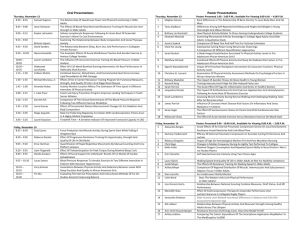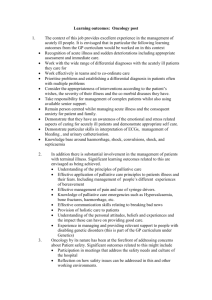Acute Care - Upper Murray Health & Community Services
advertisement
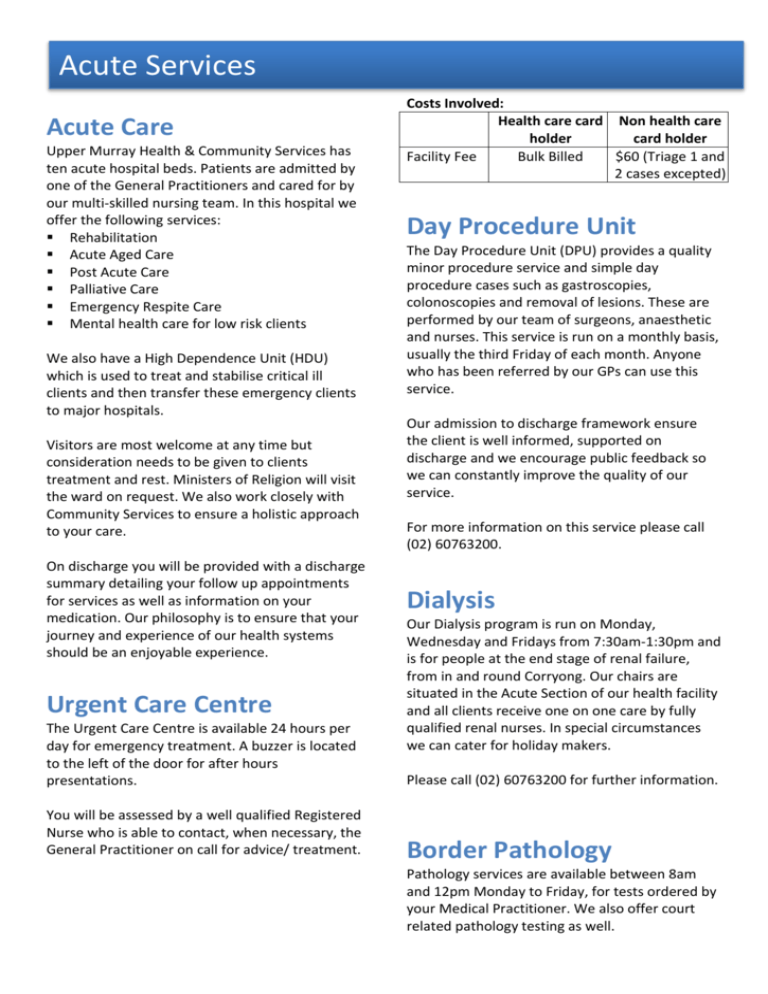
Acute Services Acute Care Upper Murray Health & Community Services has ten acute hospital beds. Patients are admitted by one of the General Practitioners and cared for by our multi-skilled nursing team. In this hospital we offer the following services: Rehabilitation Acute Aged Care Post Acute Care Palliative Care Emergency Respite Care Mental health care for low risk clients We also have a High Dependence Unit (HDU) which is used to treat and stabilise critical ill clients and then transfer these emergency clients to major hospitals. Visitors are most welcome at any time but consideration needs to be given to clients treatment and rest. Ministers of Religion will visit the ward on request. We also work closely with Community Services to ensure a holistic approach to your care. On discharge you will be provided with a discharge summary detailing your follow up appointments for services as well as information on your medication. Our philosophy is to ensure that your journey and experience of our health systems should be an enjoyable experience. Urgent Care Centre The Urgent Care Centre is available 24 hours per day for emergency treatment. A buzzer is located to the left of the door for after hours presentations. You will be assessed by a well qualified Registered Nurse who is able to contact, when necessary, the General Practitioner on call for advice/ treatment. Costs Involved: Health care card Non health care holder card holder Facility Fee Bulk Billed $60 (Triage 1 and 2 cases excepted) Day Procedure Unit The Day Procedure Unit (DPU) provides a quality minor procedure service and simple day procedure cases such as gastroscopies, colonoscopies and removal of lesions. These are performed by our team of surgeons, anaesthetic and nurses. This service is run on a monthly basis, usually the third Friday of each month. Anyone who has been referred by our GPs can use this service. Our admission to discharge framework ensure the client is well informed, supported on discharge and we encourage public feedback so we can constantly improve the quality of our service. For more information on this service please call (02) 60763200. Dialysis Our Dialysis program is run on Monday, Wednesday and Fridays from 7:30am-1:30pm and is for people at the end stage of renal failure, from in and round Corryong. Our chairs are situated in the Acute Section of our health facility and all clients receive one on one care by fully qualified renal nurses. In special circumstances we can cater for holiday makers. Please call (02) 60763200 for further information. Border Pathology Pathology services are available between 8am and 12pm Monday to Friday, for tests ordered by your Medical Practitioner. We also offer court related pathology testing as well. Domiciliary Midwifery Advanced Care Planning Domiciliary Midwifery nursing provides in home support for mother, baby and the family following discharge from hospital. We also provide low risk clients with ante natal care. If your choices for future health are known, they can be respected Childbirth Education provides women and their partners with the knowledge and skills required for a healthy lifestyle during pregnancy, birth and early childhood. Please contact the Medical Clinic on (02) 60763290 for information. Information can also be obtained by containing a midwife through the acute services on (02) 60763204. Medical Imaging Medical Imaging at UMHCS aims to provide quality imaging in a timely manner, without the need for travel. We provide quality x-ray and ultrasound services to our community members, regardless of age. Our hours are Monday 9am3pm, Tuesday 9am-3pm as well as 24/7 on call services. Costs Involved: Health care card holder Facility Fee Bulk Billed Non health care card holder $30.00 Please contact (02) 60763290 for further information. Palliative Care Palliative Care is a holistic approach and is provided by a multi-disciplinary skilled team including medical officers, allied health, home care, district nurses, volunteers, social workers, grief counselors and acute staff. Hours are by arrangement. Our aim is to focus on wellness while meeting the needs of people whose illness is not responsive to curative treatment. We also provide ongoing support to the individual and family as and when needed. About 85% of people will die after chronic illness, not a sudden event. This means that most people will benefit from considering the type of care they would want during that illness, particularly near the end of their lives. Up to 50% of Australians will not be able to make or express their own decisions when they are near death. Doctors and family members will be unaware of any treatment preferences at this time if these have not been discussed and recorded earlier. Often, families are unaware of their loved one’s views about what they would want done when too ill to speak for themselves. Families often feel burdened by the concern that they will make a wrong choice. If there is not a clear statement of a person’s wishes, doctors must treat them in the most appropriate way. This can mean aggressive treatments that the person might not have wanted. Many people are now kept alive under circumstances that are not dignified and this can cause unnecessary suffering. Advanced care planning is a series of steps you can take to help you plan for your future health care. Advanced Care Planning is an important process. It involves talking with friends and loved ones about your future health care wishes, documenting what you may or may not want and it can include appointing a substitute decision maker. It enables you to take control of your future health care and treatment if you are not able to communicate your wishes. Advanced care planning is based on: Making sure that people are fully informed about their illness and treatment options Giving people the opportunity to reflect upon, and discuss with their loved ones, their future and the way this will be managed by health professionals Assisting people to clarify their views regarding acceptable and unacceptable outcomes if their condition deteriorates Supporting people to record their views and to appoint a trusted substitute decisionmaker Providing training to doctors, nurses and allied health workers so that they can discuss advance care planning with people and their families Providing a comprehensive system for documenting and communicating health care choices Developing clear and easy to understand information materials which explain advance care planning to people. Please contact the NUM or the Practice Nurses for further information on (02) 60763200.
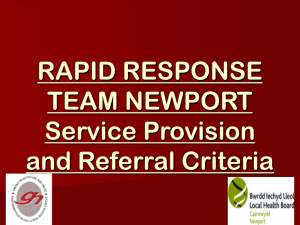
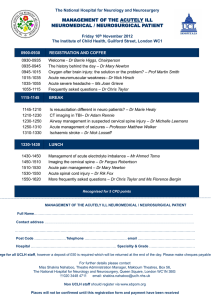
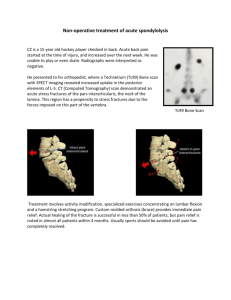
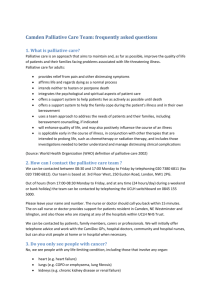
![[Lodi Memorial] Readmission Evaluation Tool](http://s3.studylib.net/store/data/005897421_1-bed185955272958f26cfef7b1d7de2a8-300x300.png)
